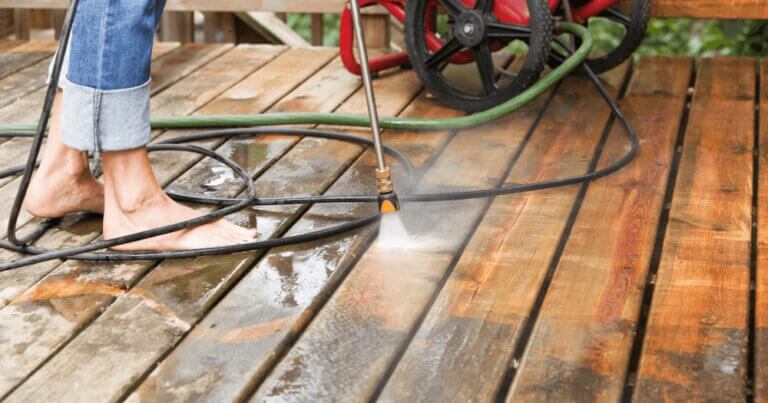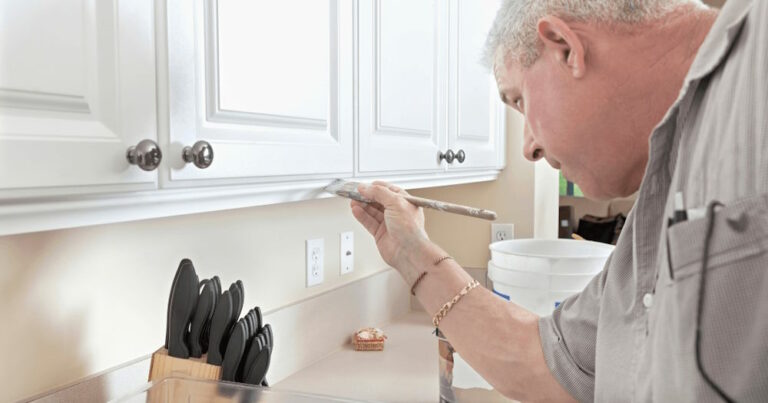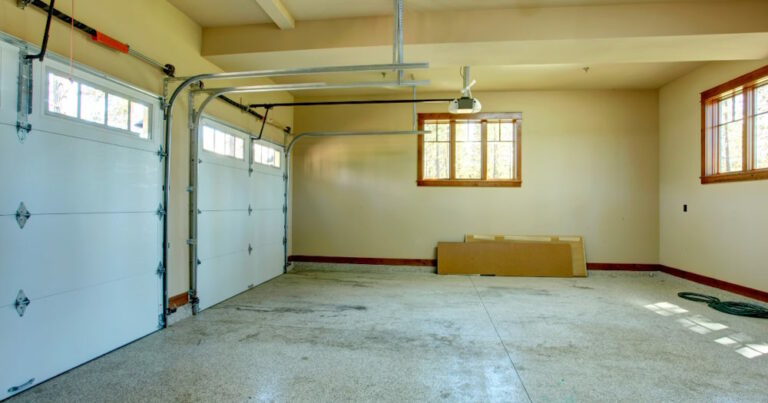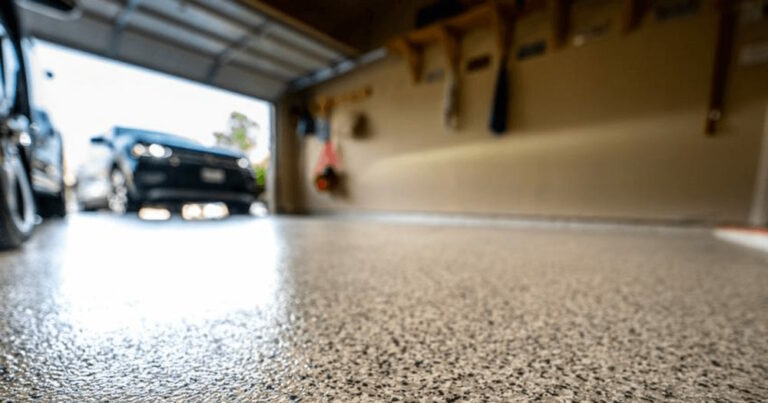When it comes to enhancing the look and durability of your basement floor, epoxy coating is a practical solution. However, the cost of epoxy basement floors can vary depending on several factors such as type, size, and condition of the floor, among others.
In this comprehensive guide, we’ll explore all the elements that contribute to the epoxy basement floor cost. Whether you’re a budget-conscious homeowner or planning a renovation, this guide will equip you with everything you need to know.
Key Takeaways
- Epoxy flooring cost can be influenced by various factors such as the type of coating, the size of the floor, and the condition of the existing floor.
- Proper surface preparation and repairs are essential in achieving a long-lasting and sturdy epoxy floor coating, thus affecting the overall cost.
- Understanding the material and labor costs, as well as additional expenses such as optional upgrades and maintenance, can help you budget effectively.
- Comparing epoxy floors to other flooring options such as carpet, tile, and hardwood can help you make an informed decision.
- DIY installation may save you money upfront, but hiring professionals can ensure proper installation and potentially save you more money in the long run.
Factors Affecting Epoxy Basement Floor Cost
Several factors can affect the cost of installing epoxy basement floors. Here are the key elements that influence the pricing:
- Size of the basement: The size of the area to be covered is a significant cost factor for any flooring project, including epoxy basement floors. Larger basements require more materials and labor, increasing the overall cost.
- Condition of existing floor: The condition of your basement floor can affect the preparation required before applying epoxy. If the floor has extensive damage or cracks, it may need repairs that can add to the total cost.
- Type of epoxy flooring: Different types of epoxy flooring systems have varying costs. Solid epoxy is typically the most affordable option, while decorative options like metallic epoxy and epoxy flake can increase the cost due to additional materials and labor required.
- Preparation and Repairs: Proper preparation is essential for a long-lasting epoxy basement floor. If your floor requires significant preparation, such as concrete cleaning, crack repairs, or moisture mitigation, this can add to the overall cost.
- Epoxy flooring materials cost: Epoxy materials are available in a range of prices, from low-quality, cheaper options to high-quality, more expensive ones. The cost also varies depending on the type and number of epoxy coatings required, as well as the quality and brand of the epoxy resin, colorants, primers, and sealers used.
- Labor costs: Professional installation is the most common option for epoxy basement floors. The cost of labor can vary depending on the location and complexity of the project, with more complicated or larger projects requiring more labor and increasing the overall cost.
- Additional costs and upgrades: There are optional upgrades and additional costs to consider, including floor leveling, decorative flakes or metallic pigments, and anti-slip additives. If you want to upgrade the aesthetics or functionality of your epoxy floor, these will increase the overall cost of the project.
Types of Epoxy Flooring Systems

When it comes to epoxy basement floors, there are several types of epoxy flooring systems available. Each type has its unique properties, cost implications, and aesthetic appeal.
Here are some of the popular epoxy flooring systems:
| Epoxy Flooring System | Description | Cost Implications |
| Solid Epoxy | Consists of 100% solid epoxy and is the most durable and long-lasting option. | High material cost, labor-intensive, and requires professional installation. |
| Epoxy Flake | The flakes are broadcasted over the base coat giving a decorative finish and added texture. | Mid-range cost, requires labor and material costs for the flakes. |
| Metallic Epoxy | Made of a metallic pigment and provides a unique and stunning marbled finish. | High material and labor costs; professional installation is recommended. |
Choosing the right epoxy flooring system for your basement requires careful consideration of factors such as the overall style of your home, functionality, budget, and personal preference.
Preparation and Repairs
Proper preparation and repairs are essential when installing an epoxy basement floor. Skipping these steps can lead to a shorter lifespan and higher long-term costs. Here are the critical factors that affect the cost of preparation and repairs:
| Factors | Implications |
| Epoxy floor preparation | Surface preparation is critical for attaining a durable epoxy floor. This process includes cleaning the concrete flooring thoroughly, removing any existing coating, and grinding to create a porous surface for proper adhesion of the epoxy. The cost of preparation can vary widely based on the size of the basement, the state of the existing flooring, and the required tools and equipment. |
| Basement floor repairs | Repairing any cracks, holes, and other damages on the basement floor is crucial. Failure to address these problems can lead to a weaker and less durable flooring system. The cost of repairs can vary depending on the extent of the damage and the type of repair needed, such as filling cracks or leveling the floor. |
It’s important to note that skipping preparation and repairs can lead to more significant costs down the line. For instance, without proper surface preparation, the epoxy might not adhere well, leading to peeling, chipping, and flaking. Ignoring floor repairs can also result in the same issues and may even compromise the structural integrity of the basement floor.
Working with an experienced epoxy flooring contractor can help ensure that preparation and repairs meet the highest standards and avoid costly mistakes in the future.
Epoxy Floor Material Costs
Understanding the costs associated with epoxy basement floors is critical for budgeting purposes, and the cost of materials is a significant factor to consider. In this section, we’ll examine the various materials required for epoxy basement floor installation and their respective costs.
Epoxy Resins
Epoxy resin is the primary material used for creating a durable and long-lasting basement floor. Most epoxy resins are two-part systems, consisting of a resin and a hardener. The cost of epoxy resin typically ranges from $30 to $50 per gallon, and the amount needed for a basement floor can vary depending on the square footage and desired thickness of the floor.
Colorants
While epoxy resin alone can create a sturdy basement floor, adding color to the resin can give the floor a visually appealing finish. Epoxy colorants come in various shades and are typically added to the resin mixture before application. The cost of epoxy colorants ranges from $10 to $30 per quart and may vary depending on the brand and quality.
Primers
Primers are essential for proper adhesion of the epoxy resin to the concrete surface. They help to seal the concrete pores and prevent air bubbles from forming during the application process. The cost of epoxy primers ranges from $20 to $40 per gallon.
Sealers
Epoxy sealers add an extra layer of protection to the epoxy basement floor, guarding against scratches, stains, and other damage. Sealers also enhance the overall finish of the floor. The cost of epoxy sealers ranges from $30 to $50 per gallon.
Total Material Costs
| Material | Average Cost |
| Epoxy Resin | $30 – $50 per gallon |
| Colorants | $10 – $30 per quart |
| Primers | $20 – $40 per gallon |
| Sealers | $30 – $50 per gallon |
Note that these prices are just estimates and can vary depending on factors such as location and quality of materials.
It’s important to keep in mind that the cost of materials is just one aspect of the overall cost of an epoxy basement floor. Other factors, such as labor costs and any necessary repairs or preparation work, could impact the final cost. However, understanding the material costs can help you budget effectively for your project.
Labor Costs
Hiring professionals to install epoxy basement floors is a wise move, especially if you don’t have the necessary DIY skills or equipment. However, it’s essential to know how much labor costs can add up to the overall budget.
Epoxy floor labor costs are calculated based on the complexity of the project, the location, and the experience level of the contractor. On average, labor costs range between $3 and $12 per square foot.
To give you a better idea of how much labor costs can impact your budget, the following table breaks down the average costs by region:
| Region | Average Labor Cost per Sq. Ft. |
| Midwest | $3-$6 |
| Northeast | $4-$8 |
| South | $5-$10 |
| West | $6-$12 |
Keep in mind that labor costs can vary depending on the project’s size, complexity, and location. It’s recommended to get quotes from multiple contractors to compare prices and ensure you’re getting a fair deal.
Finally, it’s worth noting that the cost of hiring professionals isn’t just about the installation process. A reputable contractor can offer valuable advice on the best epoxy flooring system, help with surface preparation, and provide maintenance tips to ensure your floor lasts longer.
Additional Costs and Upgrades
While the installation cost is the main expense to consider when getting an epoxy basement floor, there are additional costs and upgrades to keep in mind. These can help you achieve a more functional, durable, and aesthetically pleasing floor. Here are some of the common upgrades and their costs:
| Upgrade | Cost |
| Floor leveling | $1.5-$3 per square foot |
| Decorative flakes or metallic pigments | $0.50-$5 per square foot |
| Anti-slip additives | $0.15-$0.25 per square foot |
Keep in mind that the cost of these upgrades depends on the size of your basement and the complexity of the project. For instance, adding intricate designs or patterns with metallic pigments can significantly increase the cost, while a simple solid color or flake system can be more budget-friendly.
It’s important to evaluate the benefits of these upgrades against their costs to determine if they’re worth the investment. For example, anti-slip additives can enhance safety and prevent accidents, while decorative flakes can add texture and create a unique look.
Ultimately, the decision to go for additional costs and upgrades will depend on your priorities, budget, and aesthetic preferences. Discuss the options with your installer to get a better idea of the costs and benefits.
Cost Comparison: Epoxy vs. Other Flooring Options
When it comes to basement flooring, homeowners have a vast array of options to choose from. However, not all options are created equal, especially when it comes to cost. In this section, we’ll compare the cost of epoxy basement floors to some popular alternatives: carpet, tile, and hardwood.
| Flooring Option | Average Cost Per Square Foot Installed |
| Epoxy | $3-$12 |
| Carpet | $2-$12 |
| Tile | $5-$15 |
| Hardwood | $8-$25+ |
As you can see, epoxy basement floors are a cost-effective choice when compared to other flooring options. While some types of carpet may cost less, they may not be as durable or long-lasting. Tile and hardwood are more expensive options that require additional maintenance and care.
Aside from cost, epoxy basement floors offer many advantages over other flooring options, such as their durability and resistance to stains, scratches, and moisture. They are also easy to clean and maintain, making them an ideal choice for busy households or in places prone to spills and accidents.
DIY vs. Professional Installation
When it comes to installing epoxy basement floors, you have two main options: DIY or professional installation. Both have their benefits and drawbacks, and the decision ultimately depends on your skills, budget, and timeline. Let’s take a closer look at each option:
DIY Epoxy Basement Floors
If you’re a skilled DIYer with experience in home renovations, installing epoxy floors can be a cost-effective option. You can purchase a DIY epoxy floor kit from hardware or home improvement stores, which typically includes epoxy resin, hardener, colorants, and other necessary materials. However, keep in mind that while DIY kits are cheaper upfront, they require careful surface preparation, proper mixing, and precise application. Failure to follow instructions can result in an uneven or poorly-adhered floor, which may lead to costly repairs or even replacement. Additionally, DIY installation may take longer than professional installation, especially if you’re new to the process.
If you choose to go the DIY route, here are some tips to keep in mind:
- Start with a clean, dry, and level surface
- Follow the manufacturer’s instructions carefully
- Apply the epoxy in thin, even coats
- Allow ample curing time before walking or placing heavy objects on the floor
- Invest in high-quality equipment and protective gear for safety
Professional Epoxy Floor Installation
Hiring a professional to install your epoxy basement floor can ensure a high-quality, long-lasting finished product. Professionals have the expertise and tools to properly prepare the surface, apply the epoxy, and address any issues that may arise during the process. While professional installation can cost more than DIY, it may save you money in the long run by avoiding costly repairs or replacements. Additionally, professional installation is often quicker and less labor-intensive than DIY.
When hiring a professional, be sure to choose a reputable contractor with experience in epoxy basement floors. Ask for references and portfolio examples, and compare quotes from multiple contractors to ensure you’re getting a fair price.
| DIY Epoxy Basement Floors | Professional Epoxy Floor Installation |
| Lower upfront cost | Higher upfront cost |
| Requires careful surface preparation, proper mixing, and precise application | Assures high-quality, long-lasting finished product |
| Risk of uneven or poorly-adhered floor | Professionals have the expertise and tools to address any issues that may arise during the process |
| May take longer than professional installation | Professional installation is often quicker and less labor-intensive than DIY |
Ultimately, the decision between DIY and professional installation depends on your priorities and budget. Consider the complexity of your project, your level of experience, and the timeline for completion before making a final choice.
Budgeting Tips and Advice
Budgeting for an epoxy basement floor project can be overwhelming, but it doesn’t have to be. With proper planning and research, you can ensure an efficient and cost-effective renovation. Here are some budgeting tips and advice to help you get started:
1. Set a Realistic Budget
Before you start any renovation project, it’s crucial to establish a budget and stick to it. Research the average cost of epoxy basement floors in your area and factor in any additional expenses, such as labor costs, materials, and upgrades. Be sure to set aside a contingency budget for unexpected expenses.
2. Consider DIY Options
If you’re on a tight budget, consider installing the epoxy floor yourself. DIY epoxy kits are available at most hardware stores and can be significantly cheaper than hiring a professional. However, be aware that DIY installation may require additional time and effort, and may have a learning curve if you have never done it before.
3. Choose the Right Type of Epoxy Floor
The type of epoxy floor you choose can greatly impact the overall cost. Solid epoxy is generally the most affordable option, while metallic epoxy and epoxy flake are typically more expensive due to their decorative elements. Consider your budget and aesthetic preferences when choosing the type of epoxy floor.
4. Limit Optional Upgrades
Upgrades like floor leveling, decorative flakes, and metallic pigments can add significant costs to your epoxy floor project. Consider limiting optional upgrades to stay within your budget and focus on the essential elements for a durable and functional floor.
5. Get Quotes from Multiple Contractors
If you plan to hire a professional, be sure to get quotes from multiple contractors. This will help you compare prices and find the best value for your money. Before hiring a contractor, check their credentials and references to ensure they are reputable and skilled.
6. Maximize the Lifespan of Your Epoxy Floor
Maintaining your epoxy basement floor can help extend its lifespan and save you money in the long run. Regular cleaning, avoiding harsh chemicals, and using floor mats and rugs can all help keep your floor looking new for longer.
By following these budgeting tips and advice, you can plan and execute a successful epoxy basement floor project that meets your needs and fits your budget.
Conclusion

We hope this guide has been helpful in providing you with a comprehensive understanding of the cost factors associated with epoxy basement floors. By considering all the elements discussed, you’ll be well-equipped to plan and budget your renovation project more effectively.
If you’re ready to upgrade your flooring, our professionals at Canyon Painting can help you transform your basement! Contact us today.
Investing in Quality
While the cost of installing an epoxy basement floor may seem daunting, remember that investing in quality materials and professional installation can lead to significant long-term savings. A well-maintained epoxy floor can last for decades, making it a worthwhile investment in your home.
Budgeting for Success
Proper budgeting and planning can help you manage the cost of your project while still achieving your desired outcome. Be sure to research materials and labor costs in your area, and consider hiring professionals for complicated installations or repairs.
Maintaining Your Investment
Once your epoxy basement floor is installed, proper maintenance is key to ensuring its longevity and cost-effectiveness. Regular cleaning, touch-ups, and sealing can prevent damage and extend the life of your floor.
By following the tips and advice provided in this guide, you’ll be able to make informed decisions about your epoxy basement floor project, ultimately resulting in a beautiful, durable, and long-lasting floor.
FAQ
Why is proper preparation and repairs important for epoxy basement floors?
Proper preparation, including concrete cleaning and crack repairs, is crucial for achieving a durable and long-lasting epoxy basement floor. It can also impact the overall cost of the project.
How much do epoxy materials for basement floors cost?
The cost of epoxy materials, such as resins, colorants, primers, and sealers, can vary based on quality and brand. It is important to understand these costs for budgeting purposes.
What are the labor costs associated with installing epoxy basement floors?
Labor costs for epoxy basement floor installation can vary depending on location and the complexity of the project. It is important to consider these costs when budgeting for the project.
Are there any additional costs or upgrades to consider for epoxy basement floors?
In addition to the basic installation cost, there may be additional expenses for floor leveling, decorative flakes or metallic pigments, and anti-slip additives. These optional upgrades can impact the final cost.
How does the cost of epoxy basement floors compare to other flooring options?
Epoxy basement floors can be compared in terms of cost to alternatives such as carpet, tile, and hardwood. Understanding this cost comparison can help in making an informed decision.
Should I consider DIY epoxy installation or hire professionals?
DIY epoxy flooring installation may offer cost savings, but it also comes with potential risks and challenges. Hiring professionals can ensure a higher quality result, but it may affect the overall cost of the project.
What maintenance is required for epoxy basement floors, and how does it affect the cost?
Proper maintenance is important for the longevity of epoxy basement floors. Understanding the maintenance requirements and following them can help extend the lifespan of the floor and affect its overall cost-effectiveness.
What is the importance of understanding the cost factors associated with epoxy basement floors?
Understanding the cost factors associated with epoxy basement floors is essential for making informed decisions and estimating and managing the cost of your project effectively.





